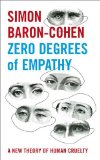May 19, 2011

The Science of Evil: On Empathy and the Origins of Cruelty by Simon Baron-Cohen (Basic Books, 2001)
(kindle ed.)
(UK ed. – Zero Degrees of Empathy – at amazon.co.uk)

Product description from the publisher:
Borderline personality disorder, autism, narcissism, psychosis, Asperger’s: All of these syndromes have one thing in common–lack of empathy. In some cases, this absence can be dangerous, but in others it can simply mean a different way of seeing the world.
In Cruel or Unusual Simon Baron-Cohen, an award-winning British researcher who has investigated psychology and autism for decades, develops a new brain-based theory of human cruelty. A true psychologist, however, he examines social and environmental factors that can erode empathy, including neglect and abuse.
Based largely on Baron-Cohen’s own research, Cruel or Unusual will change the way we understand and treat human cruelty.
See also: Reuters article “Scientist seeks to banish evil, boost empathy,” Royal Institution lecture with audio archive
Comments (0)
- cognitive science,new books,psychology
October 6, 2010

The Moral Landscape: How Science Can Determine Human Values by Sam Harris (Free Press, 2010)
(link for amazon.co.uk)
Product description from the publisher:
Sam Harris’s first book, The End of Faith, ignited a worldwide debate about the validity of religion. In the aftermath, Harris discovered that most people—from religious fundamentalists to nonbelieving scientists—agree on one point: science has nothing to say on the subject of human values. Indeed, our failure to address questions of meaning and morality through science has now become the most common justification for religious faith. It is also the primary reason why so many secularists and religious moderates feel obligated to “respect” the hardened superstitions of their more devout neighbors. In this explosive new book, Sam Harris tears down the wall between scientific facts and human values, arguing that most people are simply mistaken about the relationship between morality and the rest of human knowledge. Harris urges us to think about morality in terms of human and animal well-being, viewing the experiences of conscious creatures as peaks and valleys on a “moral landscape.” Because there are definite facts to be known about where we fall on this landscape, Harris foresees a time when science will no longer limit itself to merely describing what people do in the name of “morality”; in principle, science should be able to tell us what we ought to do to live the best lives possible. Bringing a fresh perspective to age-old questions of right and wrong and good and evil, Harris demonstrates that we already know enough about the human brain and its relationship to events in the world to say that there are right and wrong answers to the most pressing questions of human life. Because such answers exist, moral relativism is simply false—and comes at increasing cost to humanity. And the intrusions of religion into the sphere of human values can be finally repelled: for just as there is no such thing as Christian physics or Muslim algebra, there can be no Christian or Muslim morality.
Using his expertise in philosophy and neuroscience, along with his experience on the front lines of our “culture wars,” Harris delivers a game-changing book about the future of science and about the real basis of human cooperation.
See also: Author’s website, New York Times review
Comments (0)
- cognitive science,culture,happiness,new books
May 13, 2007
I hope to find a more systematic way of monitoring new & forthcoming titles, but meanwhile here are some that look interesting (found by the “poking around” method). Feel free to add more suggestions in the comments!
Five Minds for the Future by Howard Gardner (April 3, 2007)
by Howard Gardner (April 3, 2007)
The Happiness Myth: Why What We Think Is Right Is Wrong by Jennifer Michael Hecht (April 10, 2007)
by Jennifer Michael Hecht (April 10, 2007)
The Black Swan: The Impact of the Highly Improbable by Nassim Nicholas Taleb (April 17, 2007)
by Nassim Nicholas Taleb (April 17, 2007)
The Lucifer Effect: Understanding How Good People Turn Evil by Philip Zimbardo (March 27, 2007)
by Philip Zimbardo (March 27, 2007)
Smart World: Breakthrough Creativity And the New Science of Ideas by Richard Ogle (Amazon says “June 5, 2007” but it is already available)
by Richard Ogle (Amazon says “June 5, 2007” but it is already available)
Neuroscience and Philosophy: Brain, Mind, And Language by Maxwell Bennett, Daniel Dennett, Peter Hacker, John Searle (May 2007)
by Maxwell Bennett, Daniel Dennett, Peter Hacker, John Searle (May 2007)
The Accidental Mind: How Brain Evolution Has Given Us Love, Memory, Dreams, and God by David J. Linden (March 31, 2007)
by David J. Linden (March 31, 2007)
Baboon Metaphysics: The Evolution of a Social Mind by Dorothy L. Cheney and Robert M. Seyfarth (May 15, 2007)
by Dorothy L. Cheney and Robert M. Seyfarth (May 15, 2007)
The World in My Mind, My Mind in the World: Key Mechanisms of Consciousness in People, Animals and Machines by Igor Aleksander (May 1, 2007)
by Igor Aleksander (May 1, 2007)
The Character of Consciousness (Philosophy of Mind) by David Chalmers (March 1, 2008)
by David Chalmers (March 1, 2008)
The Stuff of Thought: Language as a Window into Human Nature by Steven Pinker (September 11, 2007)
by Steven Pinker (September 11, 2007)
Comments (0)
- consciousness,culture,happiness,mind,new books





